The arrival of Spring is a celebration of new life and it is also an opportunity for all Australians to grow in our personal understanding of the condition of dementia – the second highest cause of death amongst Australian men (1) and the leading cause of death of Australian women (2). This year the theme of Dementia Awareness Month is Small Actions. Big Difference.
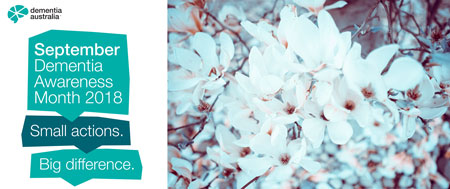
One of the smallest actions we can all improve that WILL make a big difference to the people we love with dementia, is to slow down and LISTEN better.
“I’m excited”
I was talking to one of our clients this week, a very sweet lady called Rose (not her real name). We were taking Rose to the NSW Art Gallery followed by a “Ladies Lunch Out”. Despite her great difficulty finding her words and speaking (aphasia) when I asked Rose how she was, she told me how “excited” she was to be going out to the Art Gallery. “Excited” was Rose’s description.
We know Rose loves art. This time last year, Rose spoke fluently AFTER visiting the Archibald Exhibition and I wrote about how the NSW Art Gallery visit had produced an amazing improvement in her speech for a number of days.
“I was disappointed”
After telling me how excited she was, Rose told me how “disappointed” she had been recently when a relative had come to her home and “went out without” her. She explained that she had also “wanted to go out” but was told she “had to stay home”.
People with a dementia condition are so often underestimated in their ability to communicate and that frightens me when I see it so clearly because I realise how much they feel and miss out on. When it is hard for someone with dementia to find their words they are often ignored and excluded from a full life, yet Rose knew exactly what she was telling me and I understood her perfectly.
Slow down and listen with our ears and brain
It’s a small action to slow down and make a greater effort to listen to what someone with dementia is telling us…
To listen not only with our ears but also our eyes and our intelligence.
To value the person by listening.
To give the person time to find their words and time to express him or herself and to work out ways to help the person express themselves such as through the Voice My Choice™ Graphic Cuing System.
The Wrong Words Hurt
People with dementia who can express themselves very clearly are speaking up and advocating on behalf of their peers who cannot speak and they are telling us loud and clear that the words we use matter and can be hurtful, advocates with a dementia condition like South Australian of the Year 2017, Kate Swaffer. (Kate Swaffer was also chosen to be one of Australia’s AFR Top 100 Women of Influence 2018 for her global work advocating for the human rights of people diagnosed with dementia).
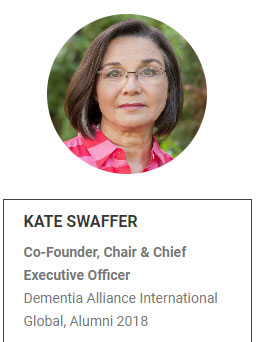
If we use the wrong words we can be unnecessarily hurtful, often without meaning to be.
Another small change that will make a big difference is to read this list that has been compiled by Dementia Australia about appropriate, inclusive and non-stigmatising words we can use. Scan over it quickly now because you and I don’t want to use inaccurate and unkind descriptions. Instead we want to use words that are empowering and positive.
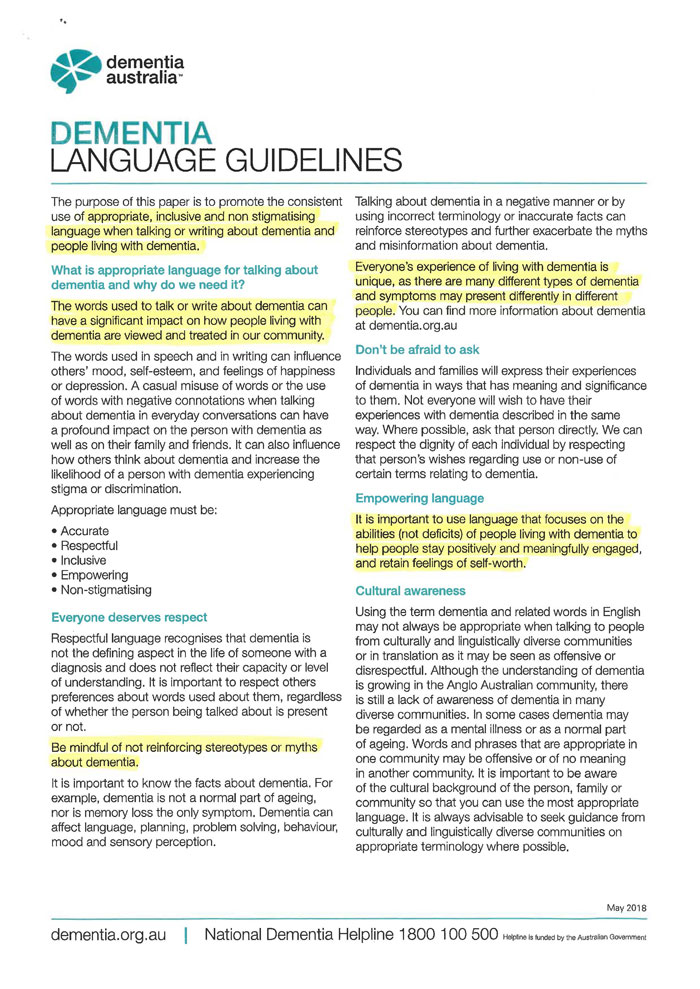
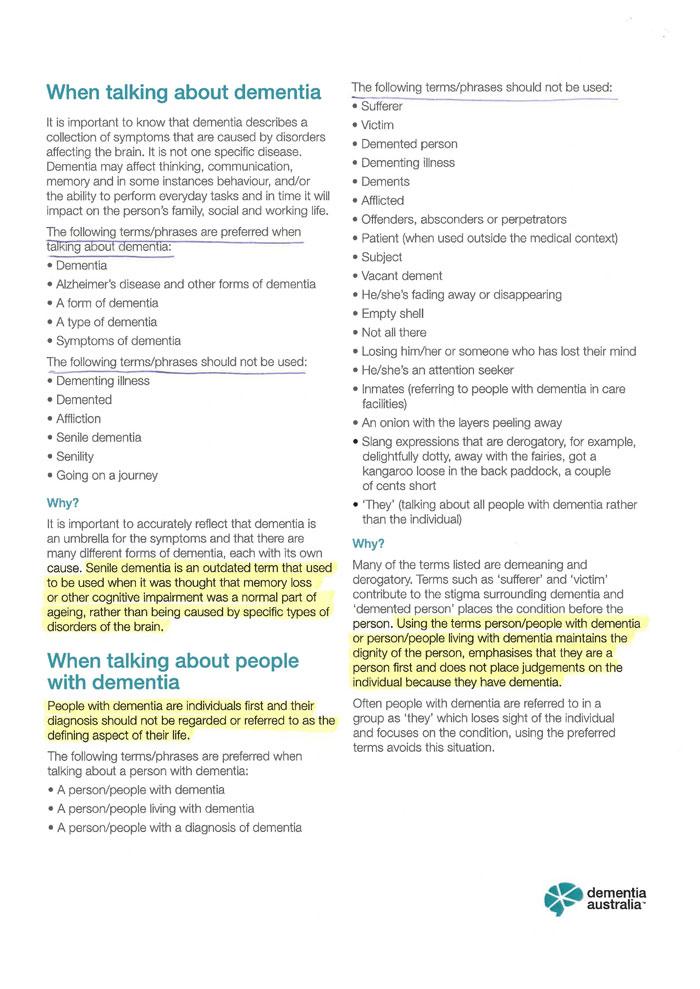
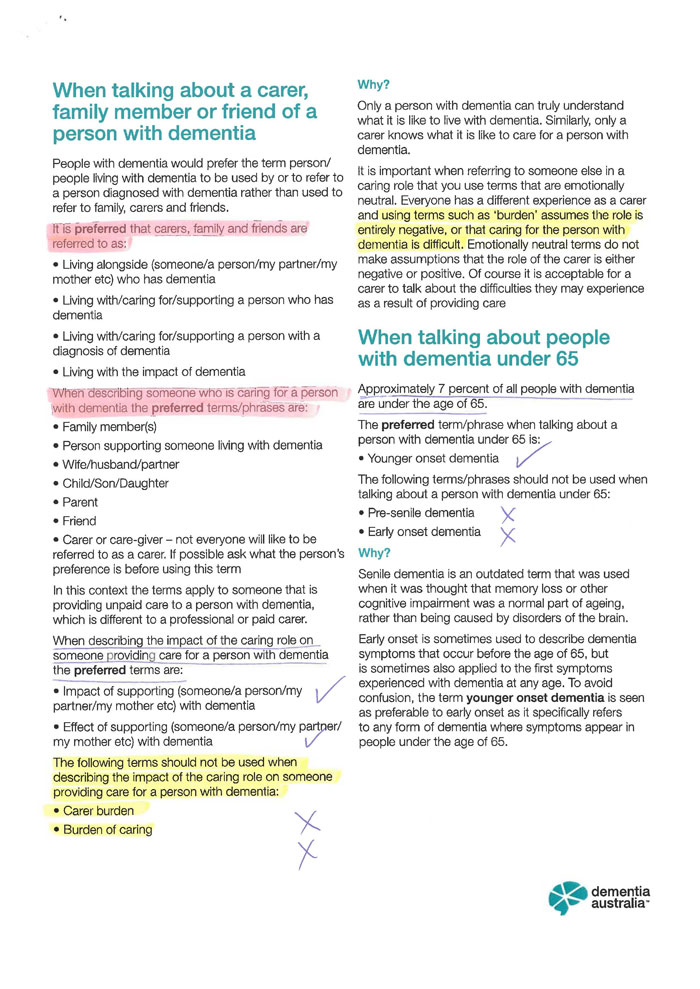
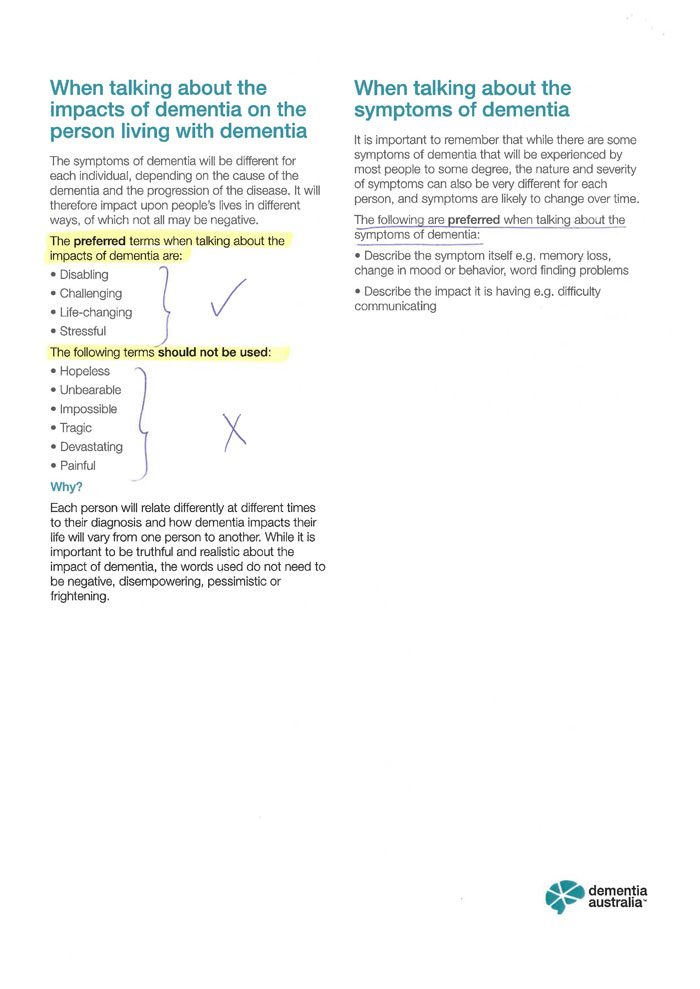
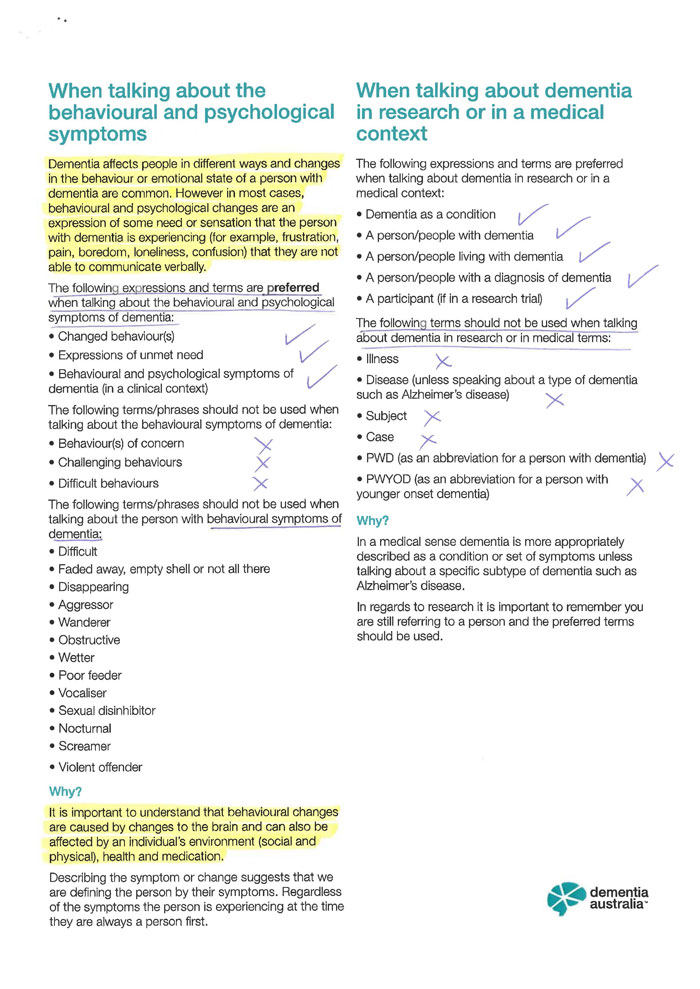
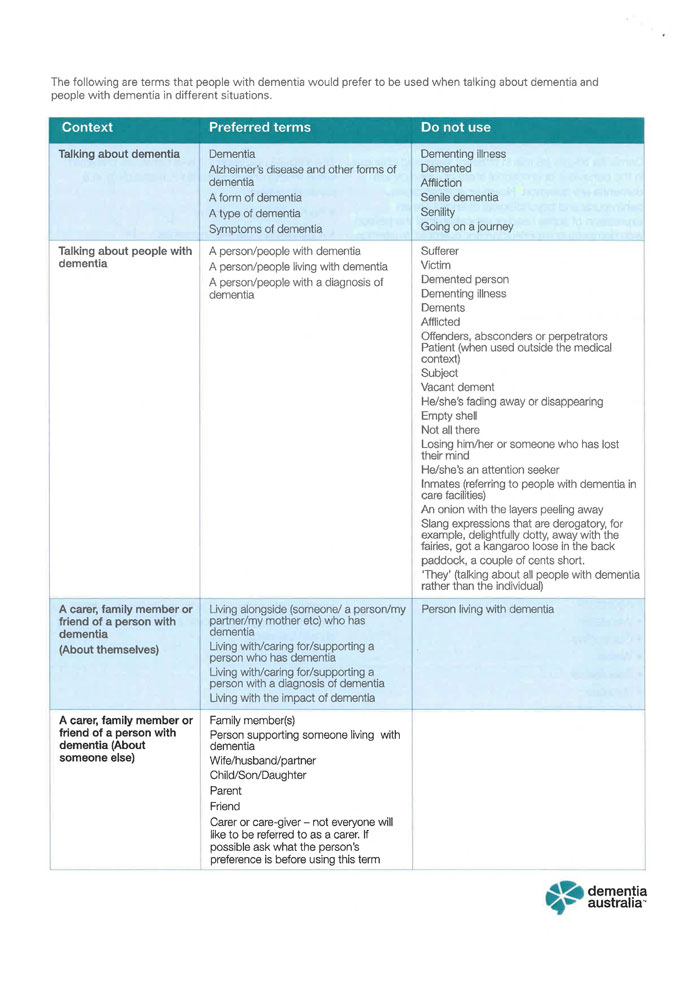
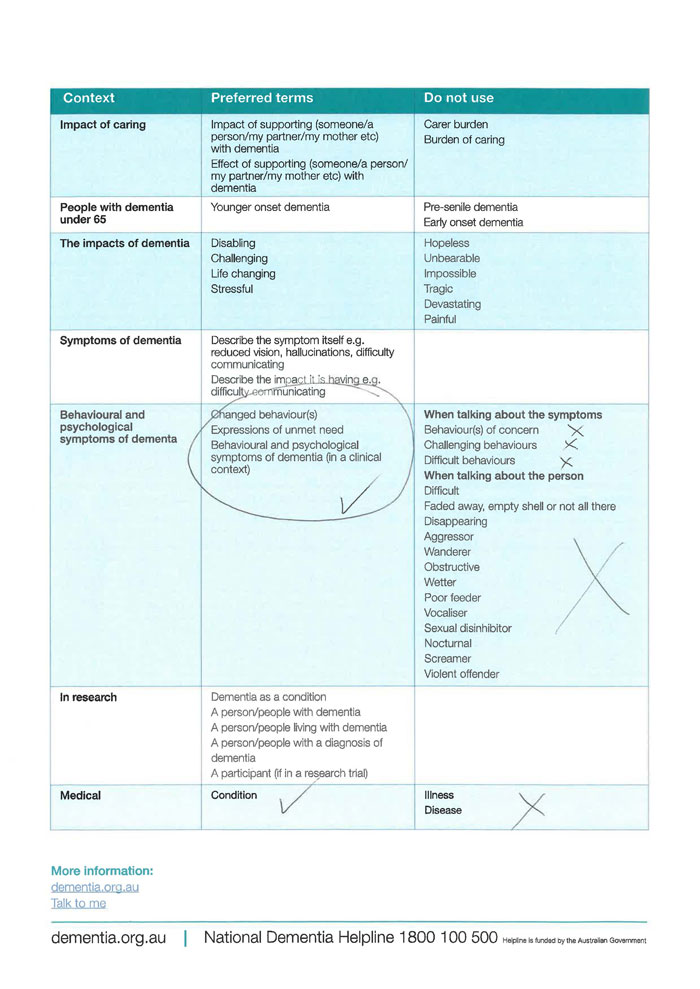
Conclusion
For 21 years Daughterly Care has specialised in supporting people impacted by dementia. More about how we are for people with a dementia condition:
Dementia Care and Music Memory
Dementia Care – Montessori Method
Dementia Care and Gardening Support
Dementia Care – Reminiense Theory
Voice my Choice – Communicaion Tool
Dementia Care and Validaion Theory
What small action will you take this Spring that will make a big difference?
Wishing you a joyful spring,
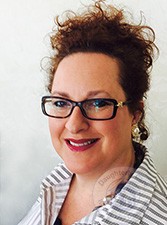
Kate Lambert
B.Ec F.Fin
Daughterly Care CEO & Co-Founder
(1) Australian Bureau of Statitistics (2017) Causes of Death, Australia, 2016 (cat. No. 3303.0)
(2) Choice and Decision Making in People with Dementia, Professor Susan Kurrle, Geriatrician, slide 3, Dementia in Australia, Better Practice for the Future Conference, Sydney, 23rd and 24th August 2018

This is so important. A big take away the general population can take from this is to stop using the word “demented” – I still hear it so much. Even from health professionals. I will share this far and wide as my small act this September, and I will be braver at introducing myself to elderly people in my community.
Thank you, Jenna, for taking the time to add your comment. Yes, I cringe when I hear the word “demented” being used. It’s an awful description as it reduces the whole person with all their continuing abilities, insight, beautiful personality and loving heart to this one word.
It’s so reductive.
I remember Verlie, our Dementia Care Nurse, providing in-home care support to a famous iconic comedian and there was only one biscuit in the house and this lady with her kind heart would not eat that biscuit with her morning cup of tea until she broke the biscuit in half and gave half to Verlie and only then would she eat her half of the biscuit. You could not call that iconic woman “demented”. She was thoughtful, generous and kind.
Enlightening thanks for the update ……become a Dementia friend !
Wonderful words here Kate and so valuable.
Mosman Blackboard last week read: Dementia Awareness Month
The number one thing someone can do for another is to say< "YOU ARE NOT ALONE".